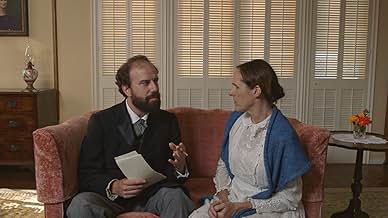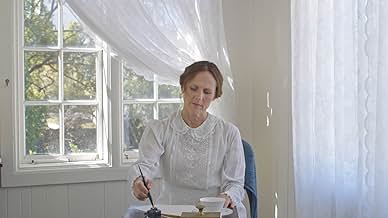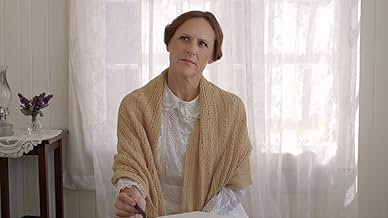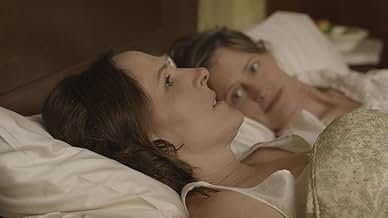NOTE IMDb
6,2/10
1,5 k
MA NOTE
Ajouter une intrigue dans votre langueDramatization of the little known side of the writer Emily Dickinson's life, in particular, her relationship with another woman.Dramatization of the little known side of the writer Emily Dickinson's life, in particular, her relationship with another woman.Dramatization of the little known side of the writer Emily Dickinson's life, in particular, her relationship with another woman.
- Récompenses
- 3 victoires et 7 nominations au total
Stella Chesnut
- Mattie Dickinson
- (as Stella Chestnut)
John Peña Griswold
- Young Austin
- (as John Griswold)
Histoire
Le saviez-vous
- AnecdotesOriginally performed as a play by the film's director, who extensively researched with support from Harvard University Press and the Guggenheim Foundation.
- GaffesAfter Susan brings the newspaper to show Emily her published poem, she (sarcastically) wishes Emily a Happy Valentine's Day as she exits. In the next shot, a tree with full foliage can be seen out the window. There are definitely no leaves on the trees in Amherst, Massachusetts in mid-February.
- ConnexionsFeatured in MsMojo: Top 10 Best LGBTQ+ Romantic Comedies (2021)
Commentaire à la une
Perhaps, the historical image of poet Emily Dickinson as morose and reclusive spinster needed corrective, to emphasize her sense of humor and to include homosexual relationships with sister-in-law Susan, as well as Kate Scott Turner, but not at the expense of all else in what is oft a tonally anachronistic and comedically inconsistent filmed play that paints most of the historical figures as caricatures. If the entire picture were a farce and not also part dramatic score settling, I suppose "Wild Nights with Emily" could be better appreciated as erudite parody, but it's not.
Ralph Waldo Emerson, of all famous public speakers, is portrayed a mumbler, lest Emily have one positive influence on her writing outside of Susan, I suppose, although at least the also-homoerotic poet Walt Whitman gets a positive mention. Astronomer David Peck Todd, an interesting historical figure for reasons I'll elaborate on in a bit (and also see my review of "The 1882 Transit of Venus"), is institutionalized decades too early. Emily's sister Lavinia is a nutty cat lady and her brother Austin a dimwitted beard whose sexual advances are continually rebuked by wife Susan, three offspring included. For all the feminism of the play, too, it oddly erases Susan's own poetry and how she may've contributed to Emily's writing beyond mere encouragement and being a "muse." Worst of all, though, is the treatment of Mabel Todd and T. W. Higginson, whose editing and promotion of Dickinson's poems and letters is what began the poet's posthumous fame. Indeed, it was only after Lavinia found Susan's progress lacking on overseeing such a publication of her sister's oeuvre that she, then, enlisted Mabel, who although hardly a poet, let alone of Dickinson's calibre, was, indeed, a published author.
I came to "Wild Nights with Emily" because of one of these supporting caricatures, as part of my investigation of the astrophotographer behind a series of photographs--since animated as a video--of the 1882 transit of Venus, David Peck Todd. By all accounts, he knew of the open secret of Mabel's affair with Austin, and he may even have encouraged it. Austin was the treasurer of Amherst College where David worked, after all, and David was a philanderer himself--his ultimate institutionalization being a consequence of going mad from syphilis, but that was decades after Emily and Austin's deaths. In the meantime, he went on 13 expeditions across the world in search for the best vantage points to observe eclipses and designed equipment in which to photograph them. Mabel traveled with him and wrote about their adventures and may've been a respected writer herself on her husband's field of astronomy. In this movie, though, David is reduced to one brief shot of raving insanity, and Mabel is turned into a silly unreliable narrator and jealous destroyer of Emily's legacy--y'know, the legacy that didn't even exist had Mabel not promoted it, including with lectures. And, as to whether Emily actually was stymied by sexism in efforts to publish her poetry, I don't know, but it hardly seems as though it was the fault of Todd and Higginson, both of whom appear to have had cordial correspondence with Dickinson (apparently, of the entirely written sort at least in the case of Mabel, who reportedly never met Emily face to face until death). Inadvertently, this also may also diminish how unique was Dickinson's writing, as well as how homophobic society in general was then; in fact, it was not only Susan's name that was erased, but titles were added, and punctuation and style were altered to conform more to orthodox literary standards of the day.
That said, however, there is some appeal to the crisscrossing between narratives from three different time periods: of Mabel's lectures, Emily and Susan as teenagers, and them as a mature couple. The Shakespeare reading scene between young Emily and Susan is amusing, and the framing of the story as a competition between two writers (or three, including one of the daughters), Emily and Mabel, supposedly one authentic and the other unreliable, isn't necessarily a bad reflexive storytelling device. Some of the acting from the minor parts seems amateurish or unrehearsed, but Molly Shannon, Amy Seimetz and Susan Ziegler do fine enough as the leads. Emily's writing isn't always integrated well within the narrative and makes for some awkward scenes, but it's to be expected that a movie about her would try to incorporate as much of her poetry as possible. Slant rhymes for a slanted corrective of an already slanted history. Perhaps, there's some poetic justice in that.
Ralph Waldo Emerson, of all famous public speakers, is portrayed a mumbler, lest Emily have one positive influence on her writing outside of Susan, I suppose, although at least the also-homoerotic poet Walt Whitman gets a positive mention. Astronomer David Peck Todd, an interesting historical figure for reasons I'll elaborate on in a bit (and also see my review of "The 1882 Transit of Venus"), is institutionalized decades too early. Emily's sister Lavinia is a nutty cat lady and her brother Austin a dimwitted beard whose sexual advances are continually rebuked by wife Susan, three offspring included. For all the feminism of the play, too, it oddly erases Susan's own poetry and how she may've contributed to Emily's writing beyond mere encouragement and being a "muse." Worst of all, though, is the treatment of Mabel Todd and T. W. Higginson, whose editing and promotion of Dickinson's poems and letters is what began the poet's posthumous fame. Indeed, it was only after Lavinia found Susan's progress lacking on overseeing such a publication of her sister's oeuvre that she, then, enlisted Mabel, who although hardly a poet, let alone of Dickinson's calibre, was, indeed, a published author.
I came to "Wild Nights with Emily" because of one of these supporting caricatures, as part of my investigation of the astrophotographer behind a series of photographs--since animated as a video--of the 1882 transit of Venus, David Peck Todd. By all accounts, he knew of the open secret of Mabel's affair with Austin, and he may even have encouraged it. Austin was the treasurer of Amherst College where David worked, after all, and David was a philanderer himself--his ultimate institutionalization being a consequence of going mad from syphilis, but that was decades after Emily and Austin's deaths. In the meantime, he went on 13 expeditions across the world in search for the best vantage points to observe eclipses and designed equipment in which to photograph them. Mabel traveled with him and wrote about their adventures and may've been a respected writer herself on her husband's field of astronomy. In this movie, though, David is reduced to one brief shot of raving insanity, and Mabel is turned into a silly unreliable narrator and jealous destroyer of Emily's legacy--y'know, the legacy that didn't even exist had Mabel not promoted it, including with lectures. And, as to whether Emily actually was stymied by sexism in efforts to publish her poetry, I don't know, but it hardly seems as though it was the fault of Todd and Higginson, both of whom appear to have had cordial correspondence with Dickinson (apparently, of the entirely written sort at least in the case of Mabel, who reportedly never met Emily face to face until death). Inadvertently, this also may also diminish how unique was Dickinson's writing, as well as how homophobic society in general was then; in fact, it was not only Susan's name that was erased, but titles were added, and punctuation and style were altered to conform more to orthodox literary standards of the day.
That said, however, there is some appeal to the crisscrossing between narratives from three different time periods: of Mabel's lectures, Emily and Susan as teenagers, and them as a mature couple. The Shakespeare reading scene between young Emily and Susan is amusing, and the framing of the story as a competition between two writers (or three, including one of the daughters), Emily and Mabel, supposedly one authentic and the other unreliable, isn't necessarily a bad reflexive storytelling device. Some of the acting from the minor parts seems amateurish or unrehearsed, but Molly Shannon, Amy Seimetz and Susan Ziegler do fine enough as the leads. Emily's writing isn't always integrated well within the narrative and makes for some awkward scenes, but it's to be expected that a movie about her would try to incorporate as much of her poetry as possible. Slant rhymes for a slanted corrective of an already slanted history. Perhaps, there's some poetic justice in that.
- Cineanalyst
- 17 août 2021
- Permalien
Meilleurs choix
Connectez-vous pour évaluer et suivre la liste de favoris afin de recevoir des recommandations personnalisées
Détails
- Date de sortie
- Pays d’origine
- Sites officiels
- Langue
- Aussi connu sous le nom de
- Wild Nights with Emily
- Lieux de tournage
- Sociétés de production
- Voir plus de crédits d'entreprise sur IMDbPro
Box-office
- Montant brut aux États-Unis et au Canada
- 519 487 $US
- Week-end de sortie aux États-Unis et au Canada
- 30 209 $US
- 14 avr. 2019
- Montant brut mondial
- 523 982 $US
- Durée1 heure 24 minutes
- Couleur
- Mixage
- Rapport de forme
- 1.78 : 1
Contribuer à cette page
Suggérer une modification ou ajouter du contenu manquant

Lacune principale
By what name was Nuits Sauvages avec Emily (2018) officially released in India in English?
Répondre




























